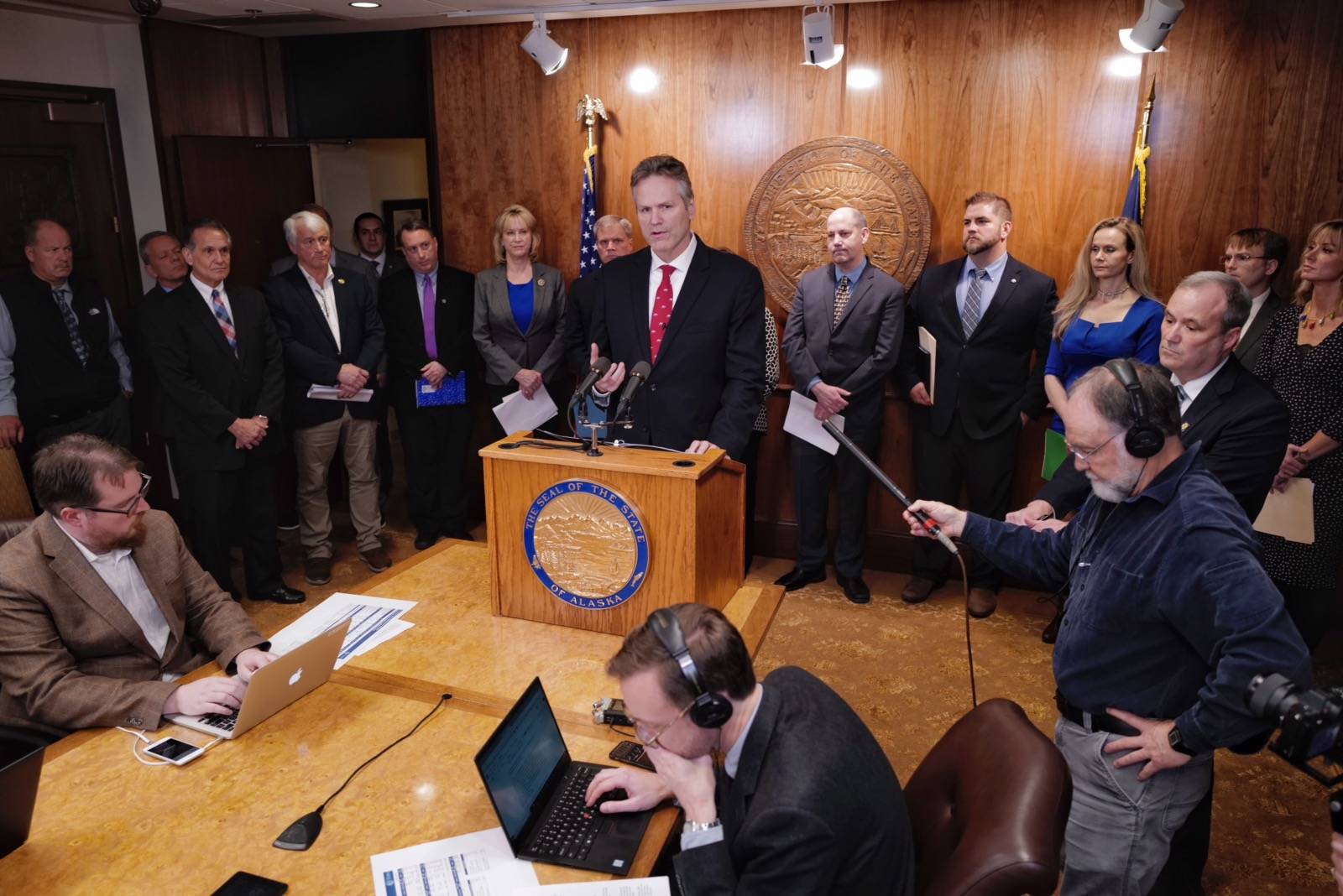In his budget released Wednesday afternoon, Gov. Mike Dunleavy signalled fiscal year 2021 would be far less about state spending cuts than 2020.
Dunleavy said his administration will continue to look for efficiencies in the budget, but that he wants the Legislature to pass laws changing how much programs are funded and an amendment for a constitutional spending limit.
He said he was going to follow the law and allocate a full Permanent Fund Dividend of $3,170.
“We’re going to honor the law, the (PFD) still has its calculation in statute, and there are a lot of programs (whose funding) are formula driven,” Dunleavy said, unveiling his budget surrounded by cabinet members at the Capitol.
But it was time to re-examine those formulas, Dunleavy said, and while he and his staff said the governor’s office is not sponsoring any legislation at this time, they want to work with the Legislature to find where reductions could be made.
“Formula-driven programs account for over half of the operating budget,” Dunleavy said. “So over half the budget is really not in my control to change. If we’re going to change any of those formulas, it has to be done with the partnership of the Legislature.”
The budget calls for $4.5 billion in unrestricted general funds, $969 million designated general funds and $760 in other state funds, according to a budget summary provided by the governor’s office.
The budget’s going to rely on the (Constitutional Budget Reserve) this year,” Dunleavy said. “About a $1.5 billion draw from the CBR, which leaves a balance of $540 million.”
The CBR is a savings account created in 1990 where state revenue from mineral resources is desposited according to the Department of Revenue. The CBR has been steadily decreasing since 2015, according to DOR, when it was worth just over $10 billion. The account balance was $1.96 billion at the end of October, according to DOR.
Dunleavy and his staff maintained during the press conference the budget was a starting point for discussions with the people of Alaska and the Alaska Legislature.
“The capital budget was designed to maximize federal funds,” Dunleavy told reporters, at a total of $1.3 billion. The budget includes $3.9 billion in federal funds, making up over a third of the total budget. The state portion of the unrestricted general funds was about an 8% reduction from last year, the governor said.
A press release from the governor’s office says K-12 education will be fully funded, but it makes no mention of the University of Alaska system or any programs related to higher education.
“There’s no cuts in education,” the governor said. “We’ll be rolling out some (policy) initiatives in the near future.”
The governor said the long-term outlook of the state’s fiscal situation would be centered around looking at the formula programs and potential constitutional amendments.
With this budget, the governor said he wanted to present the state’s fiscal situation to the people of Alaska.
“They’ll see that our savings are diminishing, that we’re going to have to make some hard decisions,” he said. “Are we going to reduce services, or do the people of Alaska want to ponder revenue?”
In the past, Dunleavy has said that he opposed taxes as a form of revenue. When asked about taxes Wednesday, the governor said he expected those conversations to happen in the Legislature.
“We must be considering revenue, that must be something that is on the table,” Sen. Tom Begich, D-Anchorage, told the Empire by phone Wednesday afternoon. That could be some form of taxation, Begich said.
“Sales taxes, income taxes, these are reasonable things to consider,” Begich said.
Begich noted he was concerned the governor’s budget relied so much on the CBR.
“That’s a fundamentally a problem,” Begich said. “The CBR is used for our short-term cash flow. (The Legislature) is going to have to consider how we refill that short-term account.”
The lack of proposals for revenue from the governor’s office was frustrating, Begich said. Dunleavy said he and his staff were also looking forward to some potential additional revenue from investments on the North Slope.
Taxes, however, are not something Cathy Tilton, R-Wasilla, believes Alaskans will support.
“I think we have to get a handle on what our spending is, and what is the difference between our wants and our needs,” she told the Empire in an interview Wednesday.
Tilton said she was encouraged by the governor’s insistence on following the law, particularly when it comes to the PFD. But further reductions were needed, she said in order to maintain a balanced budget.
She agreed that programs funded by formula were something that needed to be looked at, but what was really needed was a constitutional spending limit.
“I think that is an important component, just feeling that there is some kind of checks and balances on the spending,” she said.
The Legislature ultimately has power of appropriation, but the governor’s budget is a proposal of where the executive branch thinks the state should go. The governor has the ability to veto legislative appropriations if they don’t align with his goals.
Last year, Dunleavy vetoed $444 million from the Legislature’s budget setting off a summer of protests, a recall effort and a contentious special session.
The Alaska Legislature’s regular session begins Jan. 21, 2020.
• Contact reporter Peter Segall at 523-2228 or psegall@juneauempire.com.

